
XTC were an English rock band formed in Swindon in 1972. Fronted by songwriters Andy Partridge and Colin Moulding, the band gained popularity during the rise of punk and new wave in the 1970s, later playing in a variety of styles that ranged from angular guitar riffs to elaborately arranged pop. Partly because the group did not fit into contemporary trends, they achieved only sporadic commercial success in the UK and US, but attracted a considerable cult following. They have since been recognised for their influence on post-punk, Britpop and later power pop acts.
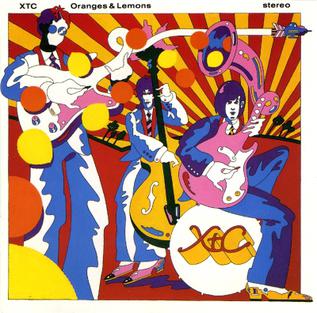
Oranges & Lemons is the 11th studio album and the second double album by the English band XTC, released 27 February 1989 on Virgin Records. It is the follow-up to 1986's Skylarking. The title was chosen in reference to the band's poor financial standing at the time, while the music is characterised as a 1980s update of 1960s psychedelia. It received critical acclaim and became the band's highest-charting album since 1982's English Settlement, rising to number 28 in the UK and number 44 in the US.

Black Sea is the fourth studio album by the English rock band XTC, released 12 September 1980 on Virgin Records. It is the follow-up to the previous year's Drums and Wires, building upon its focus on guitars and expansive-sounding drums, but with more economical arrangements written with the band's subsequent concert performances in mind, avoiding overdubs unless they could be performed live.

Colin Ivor Moulding is an English bassist, singer, and songwriter who was one of the core members of the rock band XTC. Moulding wrote their first three charting UK singles: "Life Begins at the Hop" (1979), "Making Plans for Nigel" (1979) and "Generals and Majors" (1980).

English Settlement is the fifth studio album and first double album by the English rock band XTC, released 12 February 1982 on Virgin Records. It marked a turn towards the more pastoral pop songs that would dominate later XTC releases, with an emphasis on acoustic guitar, 12-string electric guitar and fretless bass. In some countries, the album was released as a single LP with five tracks deleted. The title refers to the Uffington White Horse depicted on the cover, to the "settlement" of viewpoints, and to the Englishness that the band felt they "settled" into the record.

Nonsuch is the 12th studio album by the English band XTC, released 27 April 1992 on Virgin Records. The follow-up to Oranges & Lemons (1989), Nonsuch is a relatively less immediate and more restrained sounding album, carrying the band's psychedelic influences into new musical styles, and displaying a particular interest in orchestral arrangements. The LP received critical acclaim, charted at number 28 in the UK Albums Chart, and number 97 on the US Billboard 200, as well as topping Rolling Stone's College album chart.
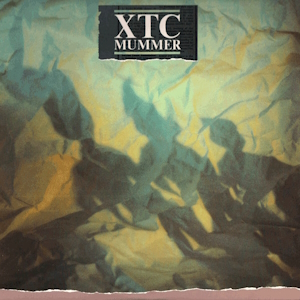
Mummer is the sixth studio album by the English rock band XTC, released on 30 August 1983 on Virgin Records. It was the first XTC album to be recorded following the band's retirement from live performance in 1982. The album's title and artwork refers to a Mummers' play, in which the identity of the players is hidden. A working title considered for the album was Fruits Fallen From God's Garden.

Drums and Wires is the third studio album by the English rock band XTC, released 17 August 1979 on Virgin Records. It is a more pop-orientated affair than the band's previous, Go 2 (1978), and was named for its emphasis on guitars ("wires") and expansive-sounding drums. The album was their first issued in the United States and their first recorded with guitarist Dave Gregory, who had replaced keyboardist Barry Andrews earlier in 1979. It features a mix of pop, art rock, new wave and punk styles with much rhythmic interplay between XTC's two guitarists.

Skylarking is the ninth studio album by the English rock band XTC, released 27 October 1986 on Virgin Records. Produced by American musician Todd Rundgren, it is a loose concept album about a nonspecific cycle, such as a day, a year, the seasons, or a life. The title refers to a type of bird (skylark), as well as the Royal Navy term "skylarking", which means "fooling around". It became one of XTC's best-known albums and is generally regarded as their finest work.

Apple Venus Volume 1 is the thirteenth studio album by the English rock band XTC, released on March 2, 1999. It was the first on the band's own Idea Records label, distributed through Cooking Vinyl in the United Kingdom and TVT Records in the United States. The album relies heavily on strings, acoustic guitars and keyboards, expanding upon the more orchestral approach developed on the group's previous LP Nonsuch (1992), whilst its lyrics reflect themes of paganism, middle age, romance and rebirth. Apple Venus Volume 1 was met with critical acclaim and moderate commercial success, peaking at number 42 on the UK Albums Chart and number 106 on the Billboard 200 in the US.
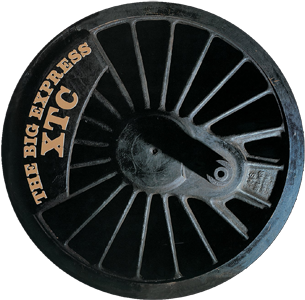
The Big Express is the seventh studio album by the English rock band XTC, released on 15 October 1984 by Virgin Records. It is an autobiographical concept album inspired by the band's hometown of Swindon and its railway system, the Swindon Works. In comparison to its predecessor Mummer (1983), which had a modest, pastoral approach to production, the album features a bright, uptempo sound marked by studio experimentation and denser arrangements, setting a template that they further developed on subsequent albums.

Homegrown is a demo album by XTC, released a year after its parent album Wasp Star on Idea Records and TVT Records. It was reissued in 2005 as part of the Apple Box.

"Senses Working Overtime" is a song written by Andy Partridge of the English rock band XTC, released as the lead single from their 1982 album English Settlement. He based the song on Manfred Mann's "5-4-3-2-1" (1964). The album and single became the highest-charting records XTC would ever have in the UK, peaking at number five and number 10, respectively.
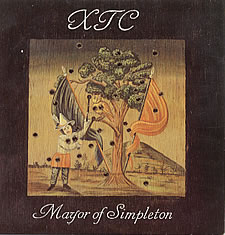
"Mayor of Simpleton" is a song written by Andy Partridge of the English band XTC, released as the first single from their 1989 album Oranges & Lemons. The single reached No. 72 on the Billboard Hot 100 singles chart, No. 1 on its Alternative Songs chart, and No. 15 on its Mainstream Rock chart, becoming the band's best-performing single in the United States.

"Making Plans for Nigel" is a song by English rock band XTC, released by Virgin Records as the lead single from their 1979 album Drums and Wires. It was written by Colin Moulding, the band's bassist. The lyrics are told from the point of view of overbearing parents who are certain that their son Nigel is "happy in his world", affirming that his future, to be spent working for British Steel, "is as good as sealed", and that he "likes to speak and loves to be spoken to".

"Grass" is a song written by Colin Moulding of the English rock band XTC, released as the lead single from their 1986 album Skylarking. It reached number 100 on the UK Singles Chart.
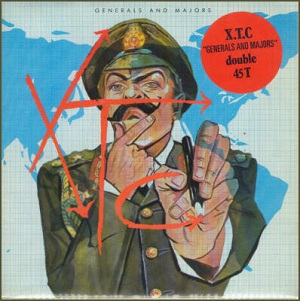
"Generals and Majors" is a song written by Colin Moulding of the English rock band XTC, released as the first single from their 1980 album Black Sea. Moulding accordingly wrote the song as a satirical take on the phrase "oh, what a lovely war". The song charted in the UK single chart at No. 32 and No. 104 on the US singles chart, while reaching No. 28 on Billboard's Album Rock Tracks chart. It was the first XTC single to chart in the U.S., and it also had chart success in Canada, Australia and New Zealand.

"Ball and Chain" is a song written by Colin Moulding of XTC for their 1982 album English Settlement. It was issued as the second single from the album on 26 February 1982, following the success of the band's biggest hit "Senses Working Overtime". The single reached No. 58 in the UK Singles Chart.

"Wake Up" is a song written by Colin Moulding of the English rock band XTC, released as the opening track on their 1984 album The Big Express. It was the third and last single issued from the album, following "All You Pretty Girls" and "This World Over", and peaked at number 92 on the UK Singles Chart.

"Respectable Street" is a song written by Andy Partridge of XTC, released as the opening track on their 1980 album Black Sea. According to Partridge, the song is about English streets and "the hypocrisy of living in a so-called respectable neighborhood. It's all talk behind twitching curtains. It's all Alan Bennett land." In another interview Partridge reveals that Respectable Street was based on a real street Bowood Road in Swindon, which was diagonally opposite the flat above a shop on Kingshill Road where he was living at the time he wrote it. Discounting the Canada-only "Love at First Sight", it was the fourth and last single issued from the LP. BBC Radio banned the song because of its references to abortion and a "Sony Entertainment Centre".




















